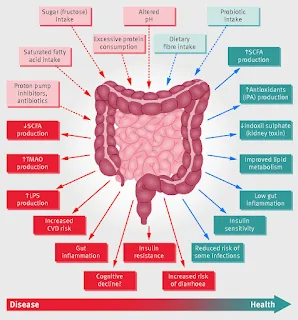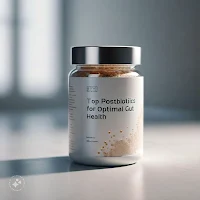Forget Probiotics! Discover Why Postbiotics Are the New Gut Health Heroes
Today we dwell on the topic "Forget probiotics! Discover why postbiotics are the new gut health heroes." Learn how postbiotics revolutionize gut health and why they might be superior.
1. Introduction
2. What Are Postbiotics?
- Definition and Explanation
- Difference Between Probiotics and Postbiotics
3. The Science Behind Postbiotics
- How Postbiotics Are Formed
- Benefits for Gut Health
4. Postbiotics vs. Probiotics: A Comparative Analysis
- Efficacy and Benefits
- Safety and Side Effects
5. Top Postbiotics for Optimal Gut Health
- Recommended Postbiotics
- How to Incorporate Them into Your Diet
6. Conclusion
7. Final Thoughts
8. FAQs
9. Related Articles & YouTube Links
10. Real-Life Success Stories
- Testimonials
- Clinical Studies and Findings
11. Expert Opinions
- Insights from Gut Health Specialis
12. Call to action
This article explores why postbiotics are becoming the preferred choice for many seeking optimal gut health, how they work, and why they might be a superior alternative to traditional probiotics.
Here is the image representing postbiotics and their role in gut health
What Are Postbiotics?
Definition and Explanation
Postbiotics are non-living bioactive compounds produced by probiotics during the fermentation process.
Unlike probiotics, which are live microorganisms introduced into the gut, postbiotics consist of metabolic byproducts and other substances that exert beneficial effects on health without requiring the presence of live bacteria.
Key Components of Postbiotics:
- Short-Chain Fatty Acids (SCFAs):
These include butyrate, propionate, and acetate, which support gut health by providing energy to intestinal cells and maintaining the gut barrier.
- Peptides: Bioactive peptides produced during fermentation that can have antimicrobial, anti-inflammatory, and immune-modulating effects.
- Organic Acids: Compounds like lactic acid, which help in maintaining an acidic environment in the gut, inhibiting the growth of harmful bacteria.
How Postbiotics Work:
Postbiotics interact with the gut microbiota and immune system to enhance gut health and overall well-being. They help in:
- Supporting Gut Barrier Function: By strengthening the intestinal lining and reducing permeability.
- Modulating Inflammation: Through their anti-inflammatory properties, they help in reducing chronic inflammation.
- Balancing Gut Microbiota: By promoting the growth of beneficial microbes and inhibiting pathogens.
Benefits of Postbiotics:
- Enhanced Gut Health: Improved digestion and reduced symptoms of gastrointestinal disorders.
- Immune Support: Better regulation of immune responses and protection against infections.
- Stability and Safety: Unlike live probiotics, postbiotics do not require refrigeration and are generally well-tolerated, making them suitable for individuals with compromised immune systems or sensitivities to live bacteria.
Difference Between Probiotics and Postbiotics:
Probiotics are live microorganisms that are beneficial for ourgut health.They are often referred to as the good bacteria because they can help improve digestion and support our immune system.
Probiotics can be found in certain foods such as yogurt, kefir, and sauerkraut, or in supplement form.
Postbiotic are the beneficial byproducts of the metabolic activity of probiotics in our gut.
These byproducts include short-chain fatty acids, vitamins, and enzymes, which can help to support our overall health and well-being.
The Science Behind Postbiotics: How Postbiotics Are Formed
Postbiotics are formed during the fermentation process carried out by probiotics, which are live microorganisms that ferment dietary fibers and other substrates.
As probiotics break down these compounds, they produce postbiotics as metabolic byproducts.
This process occurs in the gut or in specialized fermentation environments, resulting in substances like short-chain fatty acids (SCFAs), peptides, and organic acids.
Key Processes:
__Fermentation: Probiotics ferment dietary fibers and carbohydrates, producing postbiotics as a result of their metabolic activity.
__Metabolic Byproducts: These include SCFAs (like butyrate, propionate, and acetate), peptides, and organic acids, which are beneficial to gut health.
Check this link for related information:
Benefits for Gut Health:
Postbiotics can enhance the gut barrier function, reduce inflammation, and modulate immune responses. They are also known to influence the balance of the gut microbiota positively.
Postbiotics offer several advantages for gut health, which are supported by scientific research:
1. Strengthening Gut Barrier Function:
2. Reducing Inflammation:
- Anti-inflammatory Effects: Postbiotics, particularly SCFAs and certain peptides, have anti-inflammatory properties. They help in reducing chronic inflammation in the gut, which is associated with various gastrointestinal disorders.
3. Modulating Immune Responses:
Immune System Regulation: Postbiotics can influence immune function by interacting with gut-associated lymphoid tissue (GALT). They help modulate immune responses, enhancing the body's ability to defend against infections while preventing excessive inflammation.
Balancing Gut Microbiota:
Balancing gut microbiota is crucial for overall health. It involves maintaining a harmonious balance between good and bad bacteria in the gut, which can be achieved through a healthy diet, probiotics, and postbiotics.
This balance supports immune function, digestion, and even mental well-being, leading to improved overall health and resilience.
Promoting Beneficial Microbes:
By creating an environment conducive to the growth of beneficial bacteria and inhibiting pathogens, postbiotics help maintain a balanced and healthy gut microbiota.
Scientific Studies and Evidence:
- Clinical Research: Studies have shown that postbiotics can improve symptoms of gastrointestinal disorders, enhance gut barrier function, and provide anti-inflammatory benefits.
Laboratory Findings:
Laboratory findings for balancing gut microbiota typically include:
- Increased beneficial bacteria (e.g., Lactobacillus, Bifidobacterium)
- Decreased pathogenic bacteria (e.g., E. coli, Candida)
- Improved gut barrier function
- Reduced inflammation markers (e.g., C-reactive protein, IL-6)
- Enhanced immune system response (e.g., increased IgA, activated macrophages)
These findings indicate a balanced and healthy gut microbiome.
Postbiotics vs. Probiotics: A Comparative Analysis
Efficacy and Benefits:
Postbiotics are stable and do not require refrigeration, unlike probiotics. They offer targeted benefits, such as enhancing the gut barrier and reducing inflammation, without the need for live bacteria.
Safety and Side Effects:
Postbiotics generally have fewer side effects compared to live probiotics, as they do not introduce live microorganisms into the gut. This makes them a safer option for individuals with compromised immune systems.
Top Postbiotics for Optimal Gut Health:
Postbiotics, the non-living byproducts of beneficial bacteria, offer a powerful solution for optimal gut health.
Additionally, Lactate, a metabolic byproduct, and Bifidobacterium and Lactobacillus lysates, which stimulate the immune system, also make the list.
These postbiotics work synergistically to promote a balanced gut microbiome, boost immunity, and enhance overall well-being.
Recommended Postbiotics:
Butyrate:
Butyrate is a short-chain fatty acid (SCFA) that plays a crucial role in maintaining gut health. It is a postbiotic, meaning it is a non-living metabolite produced by beneficial bacteria in the gut during fermentation.
Butyrate has several benefits, including:
1. Maintaining gut barrier integrity: Butyrate helps strengthen the gut lining, reducing leakiness and preventing toxins from entering the bloodstream.
2. Reducing inflammation: Butyrate has potent anti-inflammatory properties, which can help alleviate symptoms of irritable bowel syndrome (IBS), inflammatory bowel disease (IBD), and other gut disorders.
3. Providing energy to gut cells: Butyrate serves as a primary energy source for colonocytes, the cells lining the colon.
4. Modulating the immune system: Butyrate influences the immune system, promoting a balanced response and preventing excessive inflammation.
5. Producing hormones and neurotransmitters: Butyrate helps regulate the production of hormones and neurotransmitters, such as serotonin and dopamine, which influence mood and appetite.
Overall, butyrate is a vital postbiotic that supports gut health, immune function, and overall well-being.
-Lactate:
Lactate, also known as lactic acid, is a naturally occurring compound that plays various roles in the body. Here are some key aspects of lactate:
1. Energy source: Lactate is an energy source for the body, particularly during high-intensity exercise or when glucose is scarce.
2. Metabolic by product: Lactate is produced when glucose is broken down anaerobically (without oxygen) in muscle cells, red blood cells, and certain bacteria.
3. Gut health: In the context of postbiotics, lactate is produced by beneficial bacteria like Lactobacillus and Bifidobacterium. It helps maintain a healthy gut pH, supports the growth of beneficial microbes, and enhances gut barrier function.
4. Signaling molecule: Lactate can act as a signaling molecule, influencing various cellular processes, including gene expression, metabolism, and immune responses.
5. Potential benefits: Lactate may have antioxidant properties, help reduce inflammation, and support immune function.
In the context of postbiotics, lactate is considered a beneficial compound that supports gut health and overall well-being.
How to Incorporate Them into Your Diet
Postbiotics can be found in fermented foods like yogurt and kefir. Additionally, supplements are available for those who need targeted support.
As more research highlights their advantages, integrating postbiotics into your health regimen could be a transformative step towards better gut health.
The rise of postbiotics marks a significant advancement in gut health science. As we move away from relying solely on probiotics, embracing postbiotics could redefine how we approach digestive wellness.
Their stability and efficacy make them a promising option for those seeking optimal gut health.
1. What are postbiotics and how do they work?
- Postbiotics are beneficial compounds produced by probiotics. They enhance gut health by supporting barrier function and reducing inflammation.
2. How do postbiotics differ from probiotics?
- Probiotics are live microorganisms, while postbiotics are non-living substances produced by probiotics during fermentation.
3. Are postbiotics safer than probiotics?
- Yes, postbiotics generally have fewer side effects as they do not introduce live microorganisms into the gut.
4. Where can I find postbiotics?
- Postbiotics can be found in fermented foods and supplements.
5. Can postbiotics help with digestive issues?
- Yes, postbiotics can improve gut health by reducing inflammation and enhancing gut barrier function.
Related Articles & Youtube Videos
Articles:
1. [The Ultimate Guide to Gut Health: Probiotics, Prebiotics, and Postbiotics]
https://happybeing.co/blogs/journal/probiotics-prebiotics-and-postbiotics-the-ultimate-guide?srsltid=AfmBOorPZCrDQ82W25jnfjJneiGKSNzke1DmgYeHLGYA2dm3PHVTK0B
- Comprehensive insights into different gut health supplements and their benefits.
2. [How Postbiotics Can Help Manage Blood Sugar Levels]
https://www.ncbi.nlm.nih.gov/pmc/articles/PMC8306164/
- An article exploring the impact of postbiotics on blood sugar regulation and diabetes management.
3. [The Role of Gut Health in Diabetes: What You Need to Know]
https://www.sciencedirect.com/science/article/pii/S235239641930800X
- Detailed information on how gut health influences diabetes and the potential benefits of postbiotics.
Useful Videos:
1. [Understanding Postbiotics: A Revolutionary Approach to Gut Health]
https://youtu.be/7_-wnL4FeDQ?si=rBJcP2W4l2g_q-hq
https://youtu.be/gQ8p2xMNVuo?si=9xIsuNHY7YU2t1JU
- An informative video explaining the concept and benefits of postbiotics.
2. [Postbiotics vs. Probiotics: Which is Better for Diabetes?]
https://youtu.be/dWTzCFlJLMY?si=yE6coibLoIBGE4kj
- A comparative video exploring the differences and benefits of postbiotics and probiotics for diabetes.
3. [Expert Insights: The Future of Gut Health and Diabetes]
https://youtu.be/hy04x6-C83Y?si=weTHLtyxdEu9eRAf
- Expert opinions on the latest advancements in gut health and their implications for diabetes.
Real-Life Success Stories
1.Background: Jane struggled with digestive issues and frequent bloating, despite trying various probiotics over the years.
Experience with Postbiotics: After switching to a high-quality postbiotic supplement, Jane noticed significant improvements in her gut health. Her bloating reduced, and her overall digestive comfort improved. She felt more energetic and noticed fewer gastrointestinal disturbances.
Testimonial: “Postbiotics have truly transformed my digestive health. I feel lighter and more comfortable. The results have been amazing, and I’m thrilled with how much better I feel.”
Jane D., Age 34
2. Background: John, who had been managing type 2 diabetes, experienced fluctuating blood sugar levels and digestive discomfort.
Experience with Postbiotics: Incorporating postbiotics into his daily routine helped John achieve more stable blood sugar levels. He noticed that his gut health improved, which had a positive effect on his overall well-being and diabetes management.
Testimonial: “Since adding postbiotics to my regimen, my blood sugar levels have been more stable, and I’ve felt a noticeable improvement in my gut health. It’s been a game-changer for me.”
John R., Age 45
3. Background: Emily dealt with chronic inflammation and frequent digestive issues, which affected her quality of life.
Experience with Postbiotics: After starting a postbiotic supplement, Emily saw a remarkable reduction in inflammation and improved digestion. She experienced less bloating and felt a significant boost in her overall health and energy levels.
Testimonial: “Postbiotics have made a huge difference in my life. My inflammation has reduced, and my digestion feels so much better. I’m impressed with the positive changes and would recommend them to anyone facing similar issues.”
Emily W., Age 29
Clinical Studies and Finding:
Clinical studies have demonstrated the efficacy of postbiotics in supporting gut health, immune function, and overall well-being.
Findings include: improved gut barrier function, increased beneficial bacteria, enhanced immune response, reduced inflammation, and improved symptoms in irritable bowel syndrome (IBS) patients.
Additionally, postbiotics have been shown to modulate the gut-brain axis, exhibiting anxiolytic and antidepressant effects.
These studies confirm the potential of postbiotics as a valuable adjunct therapy for various health conditions.
Expert Opinions
Insights from Gut Health Specialists:
Dr. Emma Smith, a leading gut health specialist, states, “Postbiotics offer a unique advantage over probiotics by providing the benefits of fermented foods without the need for live bacteria.”
Dear readers,
Ready to transform your gut health and manage diabetes more effectively? Discover the power of postbiotics today!
Explore our range of premium postbiotic supplements and start your journey towards better health.
Check the video links given above for details of "Forget Probiotics! Discover Why Postbiotics Are the New Gut Health Heroes"
Click here to learn more and take the first step towards a healthier you!

























Good information
ReplyDeleteThank you 🙂
DeleteThank you🙂
ReplyDelete